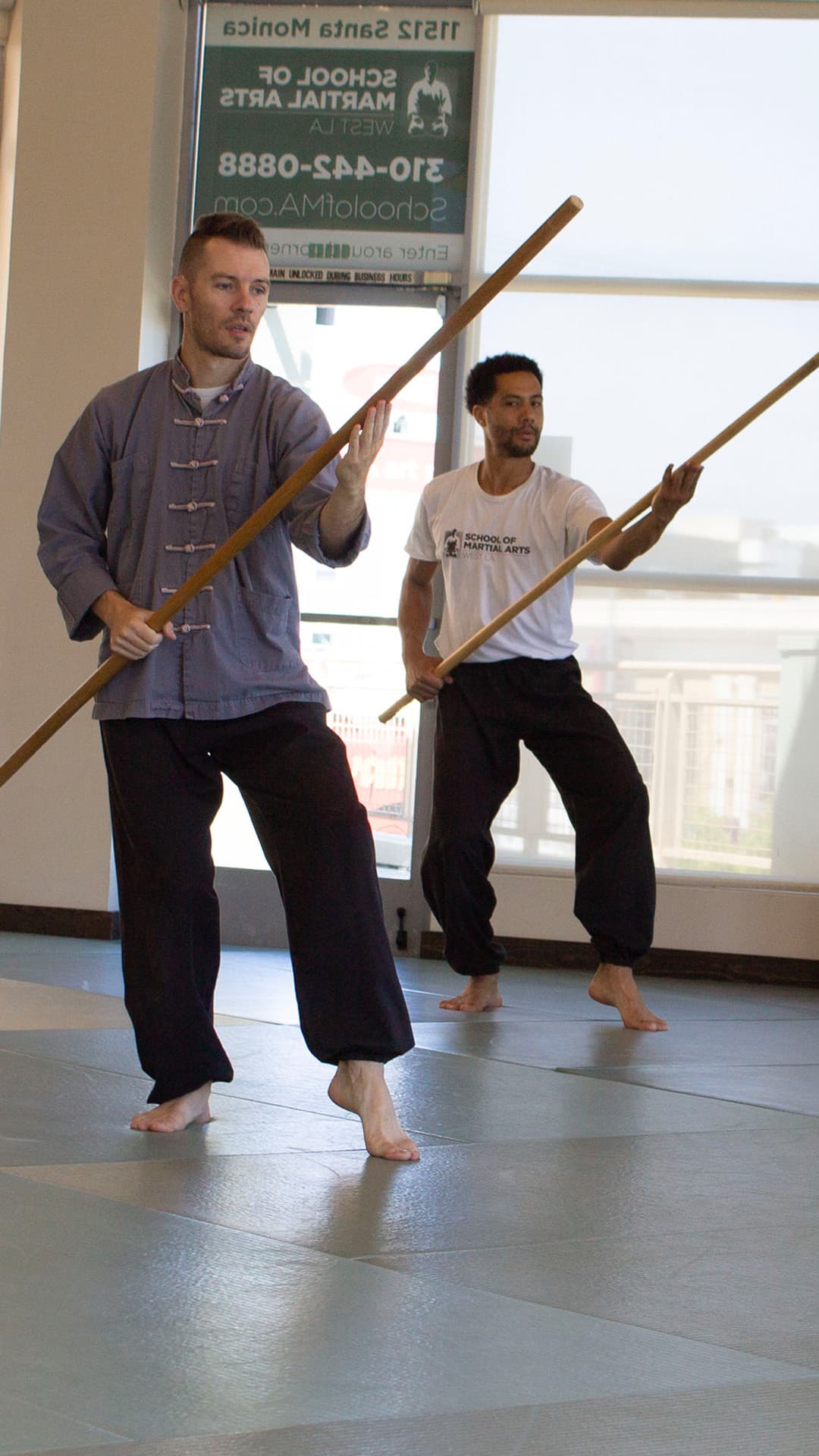Pain vs Suffering
About a year ago, one of the kids in our Wushu class was practicing sidestepping and hitting focus mitts. She got hit in the nose and it began bleeding. Her partner (her brother) immediately felt terrible. Even I was momentarily upset by the incident, since even minor injuries are very rare in our school thanks to the great partner skills and mindfulness of our students. The young lady with a bloody nose was the only person unfazed. She spent 30 seconds in the bathroom cleaning herself up and got right back on the mats to resume practice. She even seemed to wear the tissue stuffed in her nose as a badge of courage.
This is not the way most people handle pain. When I don’t see a student in class on their normal day, I’ll ask them where they were. The answers I get sometimes are pure comedy. I’ve seen people sidelined by stuffy noses and hangnails. Seriously.
I’ve also seen students go the opposite direction and come to class with fairly serious injuries. One student practiced for months with her arm in a sling from an accident doing something far more dangerous than martial arts (I want to say skiing).
What is pain?
Pain is a physical sensation. It comes in many forms. Sometimes pain is sharp like a stab, and sometimes it aches and throbs. Pain can last a second or it can last for days. Some pain persists to a point where we eventually become numb to it.
In our classes, the vast majority of the pain we experience is what I like to call good pain. The pain that comes from a great workout in a tough class, usually an ache. This pain helps us go to sleep with the knowledge that we pushed ourselves. If we feel sore in the morning, we can’t help but smile to ourselves as we get dressed a little more slowly. This pain helps us grow physically and mentally.
Then there’s bad pain. This has a tendency to be sharp and intense and signifies an injury of some kind. This can be caused by anything from a bruise to a tear. Some of these we can and should move past immediately, as the young lady did with her bloody nose. Others, we should really pay attention to. Don’t just ignore pain. It exists to draw our attention to something that we may need to take care of. You probably know someone who refused to get medical help for something that eventually became a real problem.
I have been guilty of ignoring pain myself on countless occasions. For me, running can be just awful. I never learned a good technique, and spent years with hip and knee pain every time I jogged or ran any real distance. These days I’ve gotten smart and applied principles from Tai Chi and Kung Fu to keep myself safer, though I sometimes tire and slip back into that old, painful way of moving that I invented as a kid.
Did persistent pain from running (or tennis or basketball or bowling) ever stop me from practicing martial arts? I think not once. Should I ever have taken it easy and just stuck with Tai Chi for a week? Probably. Back then I’d rather gut out a few weeks moving a bit more carefully than watch the other students have all the fun. Now, I can have just as much fun working out my own students, so I take a break from sparring, grappling or falls when I need to.
What is suffering?
Suffering is a mental state. It happens when we feel pain and start making it mean something bad. We ask questions like, “how long will this last?” and “why me?” It is often this unknown nature of pain that leads to suffering. When we get sick, we wonder if we will ever get better. We google our symptoms and scare ourselves into thinking we have some terrible disease. I’ve asked myself on many a sleepless night, between coughing up my lungs, if I could handle living the rest of my life with this sickness (because, what if this cold just never went away?)
Yet, if we knew exactly how long we’d be sick for and we knew exactly what it was, would there be any real suffering? If I was sneezing today but knew my cold would be completely gone by Friday, I would take it for what it was and never even give it a second thought. If my knee hurt today but an MRI told me it was already healing, I’d just deal with it.
Suffering exists outside of pain. It’s the part that we do to ourselves, our attitude. I think the time I suffered the most in my own life was during high school. I was in my 1st long term relationship with a girl from my class, and it was brutal. I was so nervous about getting dumped that I spent almost every waking moment worrying. My mind was filled with visions of rejection and loneliness; I imagined her seeing my calls and ignoring them, just biding her time before she broke my heart. This was all of my creation. She never once actually did or said anything to encourage the drama. We eventually broke up—it was way too stressful for both of us.
A way beyond suffering
The Four Noble Truths of Buddhism teach that life is suffering. Our desires for things outside ourselves (nicer car, promotion, prettier girlfriend) can never be completely fulfilled. Thus we are constantly seeking, holding onto the illusion that we will finally be happy once we get what we want.
In Way of the Peaceful Warrior by Dan Millman, Socrates says, “If you don’t get what you want, you suffer; if you get what you don’t want, you suffer; even when you get exactly what you want, you still suffer because you can’t hold on to it forever.” Unfortunately I read that after I suffered myself out of my relationship. The happiness of getting a smart, beautiful girlfriend lasted about 0.2 seconds before I started focusing on losing her.
We all do some version of this constantly. Either we suffer from the impermanence of things in our lives, or we tell ourselves what we have isn’t good enough. In subsequent relationships, when I wasn’t so worried about getting dumped, I would instead spend my time being unsatisfied and looking for someone better.
And now, the mind-blowing truth: it doesn’t have to be this way. All we have to do is live in this moment.
While pain exists here and now, we experience suffering as a function of the past or future. Huh?
Think about it. Your body experiences pain in the moment. Let’s say you ski into a tree and break your leg. Ouch. A doctor snaps your bones back into position. Ouch. You bump your cast into a wall. Ouch.
These instances of pain are momentary. However, our mind experiences suffering all the time. After you ski into the tree, you spend hours wondering if you’ll ever walk again. You replay the memory of hitting the tree over and over again. Suffering. After the doctor tells you he’s going to reset your leg, you spend all that time leading up to it worrying about the pain that you’ll experience. Suffering. After you bump your cast you ask yourself, “How could I have been so STUPID? Did I just re-break my leg? Will I ever throw another front kick?” Suffering.
While pain brings us into the moment, our attachment to it and to other perceived terribleness in our lives is what causes us to suffer beyond that moment. We kick ourselves for the mistakes we’ve made in the past, or we worry about what will happen to us in the future. Martial arts teaches us this through different means. Take sparring for example. When we get hit, our tendency is to get attached to that punch. We think about what we should have done to get out of the way. We think about hitting our partner back to make sure we don’t look bad or feel like we’re awful at sparring. We make it personal. While we’re busy with all this worrying and strategizing, we get hit again. Then, if we’re really paying attention, we remember to breath and just wait. When our minds are clear, we can respond well to the next attack.
So how do we transcend suffering? Live in the present. Practice mindfulness and meditation. Attach your consciousness to right now through the breath. Catch yourself as soon as you start to think like a teenager in your first relationship; just enjoy the smile this person is giving you instead of wondering what they want from you. When washing the dishes, enjoy the sensation of the water on your hands instead of getting angry at the person who left the dirty dishes in the sink.
Be here, now.
–Sifu Ryan Scott





Henri
Lots to meditate on. Thanks for sharing with all of us. Your wisdom resonates even more because you share your personal experience on those topics.
Cheers,
Henri
Max Gillis
Very good Sifu!